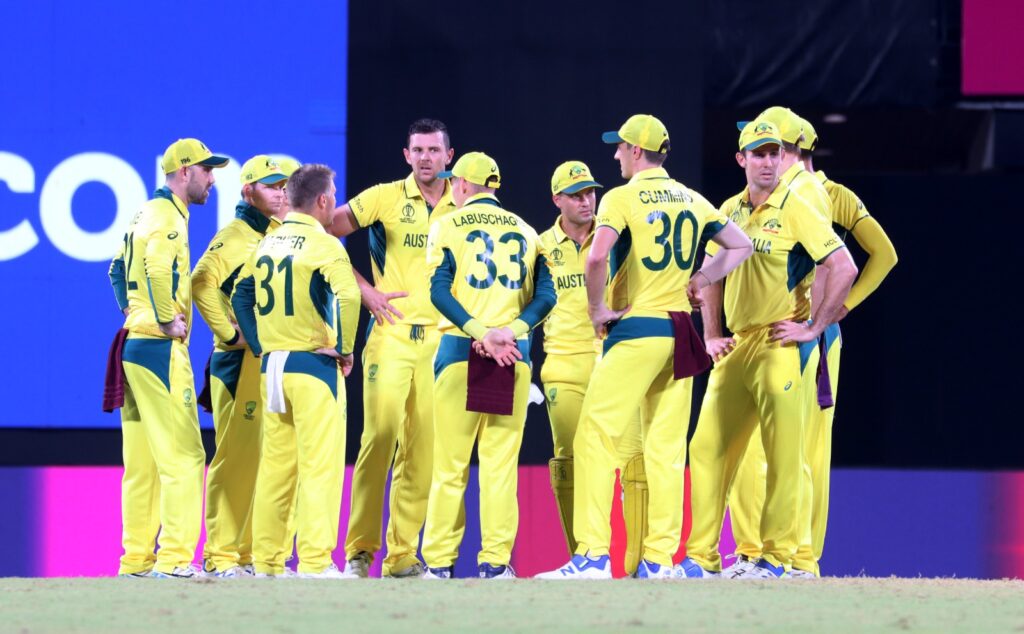
There are many qualities that spring to mind when Australian teams in World Cup history become the focus of cricket conversations. Competitive. Dominating. Fierce. Great. Fearsome. Courageous. Ruthless. These are some characteristics and words that surface the fastest. However, there is one that you would never associate Australia with. Vulnerability.
Yes, it is not a trait that Australian teams of the late 90s and early 2000s could be suspected of having. Pat Cummins’ side has shown more than a hint of vulnerability in the 10 games so far in the 2023 World Cup, having had to scrap to win the league games against Afghanistan and New Zealand, as well as the semifinal against South Africa.
Few would have imagined an Australian side beginning its World Cup campaign with two resounding defeats, against India and South Africa. Fewer still would have expected Australian batting to be blown away for scores below 200 runs in these games. And nobody would have reckoned Australia being driven with its back to the wall by an eager Afghanistan.
Who would have thought that an attack — with experienced exponents like Mitchell Starc, Josh Hazelwood, Cummins and Adam Zampa — would concede more than 300 runs in four games in a single edition of the World Cup? Who would have expected an Australian batting, with David Warner, Steve Smith and Glenn Maxwell in its ranks, to come up short so often?
Yet, it would appear as if skipper Cummins and his team have made peace with the fragility that has surfaced more often in the span of this World Cup than when it won the coveted trophy in 1987, 1999, 2003, 2007 and 2015. It is by daring to accepting its vulnerability, that doughty Australia have been able to find ways to stitch together victories.
Let’s digress for a moment. In 1987, Allan Border’s team was still rebuilding after losing many stars in the wake of their retirement in the mid 80s. It was the team that won a hat-trick of World Cup titles between 1999 and 2007, which evoked awe and fear in the opposition. Michael Clarke’s squad which won the crown at home in 2015 was also a class apart.
As it earned an eighth appearance for an Australian team in a World Cup final, this bunch has also shown an incredible ability to dig its heels in and fight hard. Just as precious metal is moulded in extreme heat, an athlete’s or a team’s character is tested in adverse situations. Australia have shown character in abundance, facing tough challenges and relying on their collective gumption to do battle.
It is this quality that their rival teams found hard to break down. New Zealand sniffed victory when chasing 389 for victory in Dharamsala, but were stopped five runs short. Afghanistan reduced Australia to 91 for seven after posting 291 in Mumbai, but could not find a way past the combine of an aggressive Glenn Maxwell and a defensive Cummins.
On Thursday night, hard as South Africa fought from a precarious 24 for four through a fabulous David Miller century, Australia kept eroding the Proteas’ determination to overcome a tag and be seen as competitive. Travis Head neutralised the potent South African new-ball attack while Jos Inglis, Starc and Cummins batted with calm heads to take their team across the line.
There has been no better example of steely resolve and resilience — something that Border and Steve Waugh’s teams were known for — than Cummins himself. Called upon to bat in crisis situations against Afghanistan and South Africa, he presented a calm head, eschewing temptation and risks to ensure victory.
Confronted possibly by fear and doubts when padded up and waiting in the dugout, the captain has been an embodiment of composure and readiness for intense battle. And that has rubbed off on his team, earning it the respect from each of its opponents. In turning the narrative from vulnerable to battling, Cummins has shown himself as a tall leader.
His approach will make a good study for those who believe that courage is rooted in and finds expression because it embraces vulnerability rather than live in denial. It is not as if he did not have the loyalty of the troops he has been leading, but by highlighting the famed Aussie spirit in the most challenging situations, he will have inspired healthier doses of admiration from his mates.
Indeed, while Australia have rarely come across as vulnerable in earlier World Cup campaigns, the renowned Aussie grit has not been in short supply in this edition, certainly not after the side lost its opening two games. And it is this trait, ingrained in the Australian DNA as it were, that India will have to overcome while seeking to exploit signs of vulnerability in Ahmedabad on Sunday.



